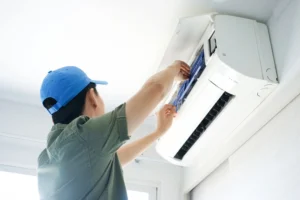Performing regular maintenance will significantly extend the life of your air conditioner. Minor problems that are addressed quickly by a technician can make a big difference in the life of your system.
To clean your condenser fins, use a brush to remove any gunk that is stuck on them. You can also use a “fin comb” to straighten any bent over time. If you are looking for a AC repair service, you can visit AC Repair Sherman Oaks to proceed.

Determining what’s wrong with an air conditioner condenser unit can be challenging. Because of this, it is often best to call in a professional AC repair service. However, there are some things you can do to help troubleshoot the issue. Check to make sure the power switch is flipped on, and the unit is plugged in. You can also reach carefully behind the unit to feel the refrigerant lines to see if they are cold. If you hear a hissing noise, that could indicate a leak. It’s important to get this repaired immediately since leaking refrigerant can damage the compressor.
Many other issues can occur with the condenser unit, including:
No cool air: The condenser is responsible for dispersing latent heat. If the coils are blocked or the fan is faulty, it will be unable to do this. This will lead to the system overheating. This can cause your energy bills to skyrocket.
Leaking: This is a common problem with the air conditioner condenser. The coils may be cracked or damaged for a variety of reasons. In addition, the run capacitor can also fail, causing the fan not to work.
Faulty components: The compressor, blower motor, and relay switch can all malfunction. These are often expensive parts to replace and should be done by an AC repair technician.
Dirty: Because the condenser is located outside, it can get more polluted than the inside of your house. This can cause the fan to malfunction and the condenser to clog. In addition, the drain pipe can become blocked by debris. It is important to clean the unit monthly to prevent this from occurring.
Because of the complexity and cost of the condenser unit, it is usually best to leave the replacement or repair to a professional. Attempting to do so can be dangerous and result in costly repairs. However, some minor problems can be handled by homeowners, such as cleaning the fan blades and ensuring that no plant growth or other items are obstructing the unit.
The evaporator and condenser coils are two essential components of your air conditioning system that work together to cool your home. The evaporator coil absorbs heat and humidity from the indoor air, while the condenser coil expels that heat to the outside. Both coils are critical to the proper functioning of an AC system, but they can also be prone to certain problems.
One common issue with the evaporator coil is that it gets clogged with dirt and dust. This can hinder the coil’s ability to absorb and release air, which can cause your cooling system to malfunction. The most common way to address this problem is to schedule regular cleanings with your HVAC contractor. Another good way to prevent the evaporator coil from getting dirty is to keep the area around it clear of yard clippings, debris, and other clutter.
Other common issues with the evaporator coil are that it stops producing cold air or emitting strange odors. A lack of cold air usually indicates that the evaporator coil has failed or has a problem with the refrigerant flow. Strange odors often mean that the evaporator coil has leaked refrigerant, a sign of serious trouble requiring immediate professional attention.
Another common issue is that the evaporator coil develops ice or frosting. This can be due to several factors, including a dirty air filter that impedes airflow through the coil or a leak in the refrigerant line. If you notice ice build-up on the evaporator coil, shut off your air conditioner and let it thaw before turning it back on.
Another concern when replacing an evaporator coil is that the new coil may need to be compatible with the rest of the unit. This mismatch can lead to higher energy bills, inefficient operation, and premature unit failure. This is why it is best to let a professional from a trusted AC repair company replace the entire unit instead of just the evaporator coil. They will be able to ensure that the replacement is a perfect fit for your air conditioning system.
The evaporator coil is critical to the operation of your air conditioner. When it’s broken or has problems with dirt or corrosion, your AC system will not work as well, and it could consume far more energy than necessary to function properly. You can help your air conditioner by noticing signs that the evaporator coil is having issues so it can be repaired.
Among the most common symptoms of a bad evaporator coil are:
Warm air is coming out of the vents. This usually means the evaporator coil is not properly absorbing and dispersing heat.
Frequent on and off cycles. The coil may be clogged or may need to be cleaned.
It was hissing or bubbling noises. These are signs of a refrigerant leak, which should be addressed immediately. This is a toxic chemical, and it’s important to keep children and pets away from any area where it might be leaking.
A noticeable increase in your energy bill. A bad evaporator coil will cause your unit to work overtime, resulting in higher energy bills than usual.
Water dripping from the coil. This is usually due to a frozen coil, but dirty air filters or blocked return ducts could also cause it.
If you see any of these issues, it’s best to call an HVAC professional immediately. A professional will be able to clean or replace the evaporator coil, and they can also recommend other preventative maintenance measures.
When a dirty evaporator coil needs to be cleaned, the first thing you’ll need to do is shut off your air conditioning unit. Then, you can remove any panels that block access to the evaporator coils and use a vacuum cleaner with a soft brush attachment to loosen dirt and debris from each coil. Be careful not to touch any electrical components while cleaning, and always use a de-greaser or cleaning solution that’s safe for use on coils.
The most serious evaporator coil issues are usually related to corrosion or leaks. If a leak develops, the entire coil will need to be replaced. This can be expensive, but it’s generally less costly than repairing or replacing the rest of your air conditioner.
The thermostat is an important part of your AC system. It works with the condenser unit to control your home’s temperature. But, like any device, the thermostat can experience problems from time to time. Some issues can be solved easily by the average homeowner, while others will require the expertise of a professional.
A common problem with the thermostat is that it won’t turn on. This can happen for several reasons, including using too many appliances at once or a power surge after a thunderstorm. The first thing to do is to check if the circuit breaker has tripped. If it has, flip it back on. If you have fuses, replace any that have blown.
Another common issue with the thermostat is that it won’t stop running once the desired temperature has been reached. This is known as short cycling and can cause a lot of wear and tear on the system. To test for this, compare the room temperature to the set temperature on your thermostat. If there’s a big difference, your thermostat may be faulty.
You should also check that the thermostat is properly plugged in. It can be easy for a cord to become unplugged, especially with window units. Similarly, an animal can chew a wire or even come loose from the unit. This can stop the flow of electricity and prevent your air conditioner from turning on.
If your thermostat isn’t working, you can try changing the batteries. If this doesn’t work, the problem may be something more serious, like a wiring problem. In this case, you should call in a professional.
Thermostat problems can be frustrating, but they’re usually not as severe as you might think. If you can follow these troubleshooting tips, you might save yourself the cost of an expensive professional repair. Having an AC that works as it should will keep your home cool all summer. Schedule an appointment with SuperTech today!
